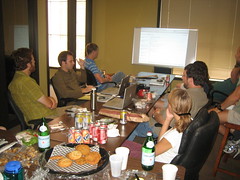Goodbye Exbiblio
November 27th, 2006 by Adam
It has been an whirlwind year and a half at Exbiblio. This will be my last week as an employee. Hugh did a good job of describing the current situation in his post, so I won’t rehash it here.
I’ve been able to have lots of different roles: Contract Programmer, CEO (in the early days), Mac Developer, Beta Manager, Blogger, Web App Developer, Product Designer, Operations, Branding, Mail Delivery, etc… I’ve had seven different offices if you count the first months when I worked from my Bee Documents office!
I recently came across the phrase “boiling the ocean” which is a good way of describing my frustration with Exbiblio. We have been trying to change the world, business, and technology all at once without a clear plan to do so. I think we could done a much better job at carefully choosing targets and knocking them down one at a time. Hopefully, the team that remains at Exbiblio will be able to find this kind of focus.
Certainly, there have been many great positives to working at Exbiblio as well. The biggest joy has been all is the people I’ve had a chance to work with, both past and present team members…
Martin has an idea a minute, challenges convention at every opportunity, and feels that a business is only worthwhile if it changes the world for the better. Hugh takes honesty and openness in corporate blogging to a new level. Lauren has the coolest music collection ever which got me re-interested in the Beatles and older Wilco stuff. Noah introduced me to sushi which I am now addicted to. Hap exhibits the kind of living that we all aspire to. Janinne is passionate about creating the kind of work environment and culture that everyone dreams about. Arial has “integrity” tattooed to her hand, literally. Claes-Fredrik can make a game out of any technological innovation. Ed M does the best job of herding cats that I have ever seen. Thanks to Ed T for the phrases “vaguely Asian” and “classy” which I have adapted and made part of the my vocabulary. Hillary has a passion for the environment, that if it could somehow be converted to electricity, would solve all the world’s energy problems. Richard is often a cool voice of reason which is at least as valuable as his brilliant technical ability. Quentin pointed the way towards bringing Martin’s crazy ideas to fruition. Ania asks really hard questions about beauty and truth in design meetings. Ian is the kind of person everyone wants to work with and be around. Damon is so smart it’s scary. Brendan is quiet until the topic of bicycles or politics come up. Jer’s blog posts about green design speak to his passion and he illustrates images of dog food surprising well. john makes sure that we are not just a pizza pocket and Coke type of operation (who knows why we aren’t allowed to capitalize his name?). Jesse makes everything work that way it should, and has a good answer for every question.
There are many others who have been apart of the Exbiblio team. Sorry I can’t list all of you. Thanks for the memories and the knowledge you have given me.
The other great aspect of working with Exbiblio is that big dreams are the fuel that this company runs on. The dreams of the founders and employees are a very explicit part of daily operation, which is a rare and valuable environment to work in. I hope that many of the dream come true.
Thanks for the great ride, I will always be a friend and fan of Exbiblio.


